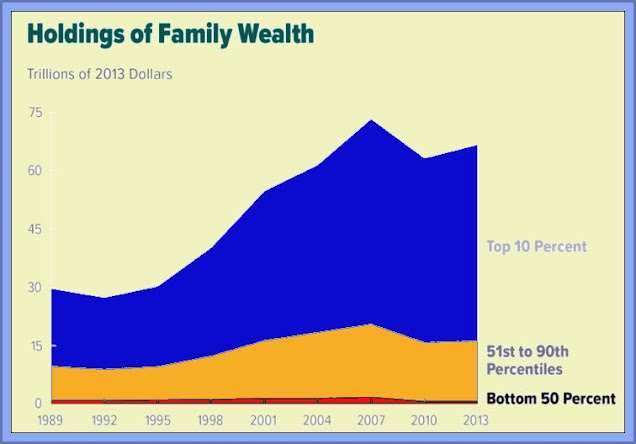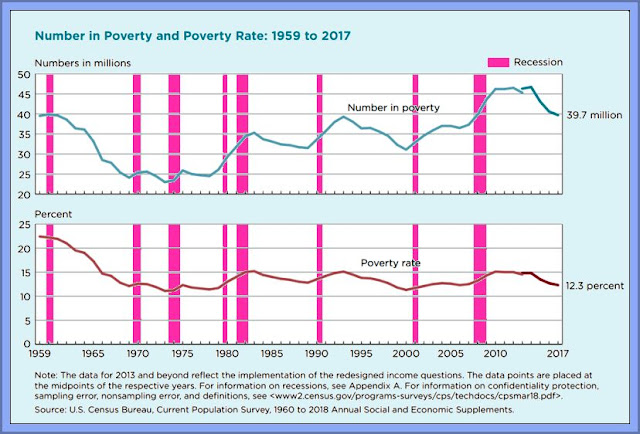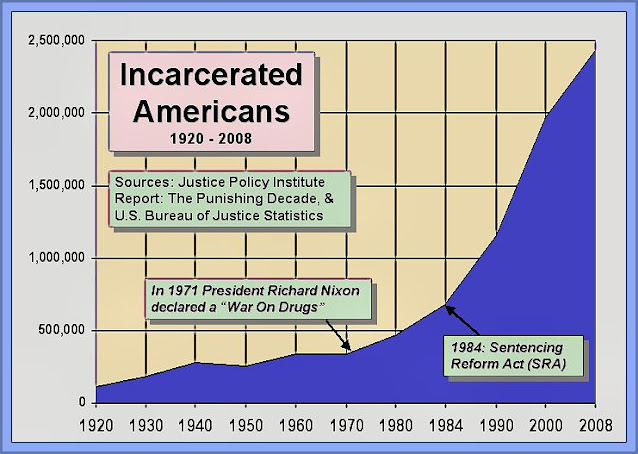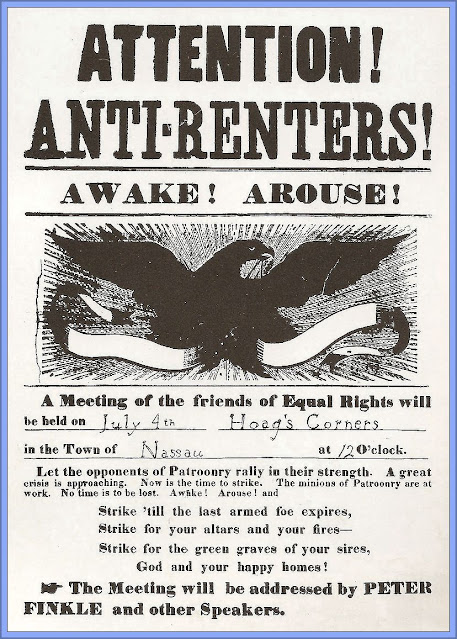 |
| Absolute Augustus - Absolute Power. |
... that's a fact throughout human history.
For most of antiquity, the rich and powerful were one and the same, as the richest man was invariably the Great King, Pharaoh, Caesar, Emperor etc etc, who handed power and wealth to their closest advisor's and supporters on a give and take basis .... they gave it, and could always take it back. But whenever larger empires arose, permanent power had to be administered via representatives, and these became secondary power bases, often with permanent wealth and power of their own.
The only alternative to this grip on wealth and power would be religious leaders, but this was rarer ... in Pharaonic Egypt for example, the temple priests of the various gods such as Amun, often held great independent power and wealth, derived from religious gifts by adherents of the faith. Similarly in Western Europe, the peculiar circumstances of the collapse of the Western half of the Roman Empire left a power vacuum, but the Roman Catholic Popes still with some power over, and protection from, the new rulers of the Italian peninsular .... this allowed them to slowly convert the pagans occupying the borders of the old empire (who wanted the 'Roman' cachet), and also gain great wealth and political power. But these alternative religious power structures were not always the rule, and so the real power stayed largely with the rich.
The secular political powers of the absolute monarchies and empires were given titles such as Consul, Governor, Baron, Duke, Lord etc, and though these individuals might lose their power in political upheavals, or even the collapse of their society via invasion, barring this latter catastrophe, their families would usually retain their wealth, and thus still have influence in the games of thrones, even as their families political fortunes waxed and waned.
Even in the case of a total collapse, the new rulers would simply replace these roles (sometimes with the existing local rich), or with their own supporters e.g. Saxon ruling society was almost completely wiped out by William the Conqueror (partly, as many of the Saxon Earls had died at Hastings), and only some religious leaders such as the Archbishop of Canterbury, Stigand, were left in place from the old elite. The only Saxon pretender, Edgar Ætheling, was allowed to live, as well as some of the other earls Edwin and Morcar, who both retained power, but later rebelled and lost their lands, while Edgar Ætheling eventually suffered a similar fate.
As the centuries have passed by, we have seen the rise of civil wealth in parallel to the existing land owning political wealth, and although these nouveau rich often became part of the political elite, it wasn't necessarily always needed, in order for them to exert power. In the middle Victorian periods of the UK and USA, the industrial barons, may or may not have overtly entered politics, but still wielded considerable power and influence in their societies. Similarly the landed classes often lost power and influence, and with the odd exception, disappeared, leaving us with the nouveau rich, industrialists, rich entrepreneurs, super rich oligarchs and politicians to wield the power .... the latter supposedly for the benefit of many, against the few.
Now the reason why I am giving this ultra quick and somewhat facile resume of wealth and power through the millennia, is to context my question. Is the US getting ripe for a political revolution?
... I ask because looking on from the side-lines, the basic conditions all appear to be there:
- Seven of the richest people on earth (declared wealth ~ Arab Royals and Russian/Chinese leaders excepted), live in the USA, with a current 585 billionaires in total (1 in every 559,000 people).
- Fairly low federal taxes, and depending upon the state, low individual state tax regimes as well.
- Basic public services (which poorer people rely on), are often under funded.
 |
| Wealth Distribution USA - Gap Rising |
- Little wealth equalisation measures since the 1970's - The rich just get richer.
 |
| Poverty Levels USA |
- Poverty 1 - If you accept the definition of "Poverty" as the lack of both money and basic necessities needed to successfully live, such as food, water, utilities, and housing, then two per cent live on under $6 dollars a day (UK 0.7%).
- Poverty 2 - By local standards of poverty (rich nations generally employ more generous definitions of poverty than poor nations). 11.8 per cent of US citizens live below the local definition of the poverty level (that's 38.1 million people).
- Health Care - Around 8 per cent have NO health insurance coverage (with about 92% of US citizens having some health insurance coverage in 2017), but for many the coverage they have has many restrictions e.g. Limited Cancer, Physiotherapy coverage etc - certainly not a universal health system.
- Crime - Gun crimes lead to a higher criminal death rate than other comparable Western countries - the criminals and their victims, nearly always from the poorest sectors of society.
 |
| Incarcerated - America Has The Highest 'Official' Prison Population |
- Prison Population: One of highest incarceration rates at 2,121,600 in prison (655 per 100,000). Context UK 83,014 incarcerated (140 per 100,000) in the world (This figure ignores China).
- Political Divide - the US over the last two or three decades has seen the two main political parties ever more divided with consensus politics rarely seen.
Now none of these indices on their own, or even one or two might signify any social instability, but many of the poorer indices fall very heavily on certain social or ethnic groups. For instance, the US Census declared that in 2014 while 14.8% of the general population lived in poverty, this fell disproportionately upon the ethnic groups:
- 10.1% of all white non-Hispanics
- 12.0% of all Asians
- 23.6% of all Hispanics (of any race)
- 26.2% of all African Americans
- 28.3% of Native Americans / Alaska Natives
And "asset poverty" (defined as being families with no savings or other assets to cover basic expenses at even poverty level income levels, for three months if anything leads to loss of income), is now estimated as being about one in four family households in the USA (its probably not much different in the UK).
 |
| Anti-Rent War Revolt |
There are countries in Latin America, Africa, Russia in the Tsarist era, and old China that have seen peasant revolts for conditions very similar - two of the biggest drivers for these revolts have been:
- Tax Inequality (the tax burden falling disproportionately on the lower incomes), and
- Social Inequality (the resources of the state are disproportionately allocated out to the rich or other minorities).
Its not as though the US, a country born over a revolt about taxation inequality, hasn't seen some problems ... the 'Anti-Rent War' of 1839–1845 was a little known example of a peasants revolt in the USA. There have also been armed revolts over taxes and over social inequality. As for racial social inequality, well that fight has been under way for nearly sixty years on both the race front, and the poverty fronts.
Politically it looks as though the reasonably close mainstream consensus politics of the 1940's through until the very early 1980's, have been replaced by what seems to be an almost total lack of consensus, and even bitter enmity. Trumps Presidency has only highlighted a trend that started with the religious conservative groups in the Republican Party, and morphed in to the Tea Party movement.
But this divide, isn't entirely caused by just a Republican drift to the right .... the Democrats have played with a Socialist and 'woke' politics in the campaigns of first Barack Obama and now Bernie Saunders, while support for an easier pathway to citizenship for illegal immigrants has moved the party away from the middle ground.
Currently, with the attempts to impeach President Trump, the political divides in the USA are likely to get even worse, while the wealth and health divides will also continue to grow. At what point does a violent fracture occur? Are there any safety valves left in the US society, where these pressures can be eased, and some healing take place? I guess we shall see over the next few years.
But all the conditions of a volcano are there, or appearing, and it behoves the politicians to come up with some consensus policies, to let the steam pressure out of the political and social system .... or else.

Its only gotten worse since Trumps second term. His tax bill has again rewarded the rich and impoverished the lower sections of society.
ReplyDeleteHealth Care premiums are just one aspect of the breaking of the concept of each paying their fair dues to create a fair and just society.
If there is to be any changes in the situation then something has to give. The rich should pay more in taxes and health care properly funded.
I guess that under Trump this isn't going to happen. Thanks for the comment.
Delete